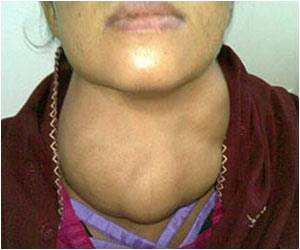The presence of short segments of genetic material (known as microRNA) within papillary thyroid cancer tumors suggests a likelihood of recurrence after patients undergo surgery, finds a new analysis.

By studying tumor tissue from patients with papillary thyroid cancer, the most common endocrine malignancy, PhD candidate James Lee*, MBBS, FRACS, of the Kolling Institute of Medical Research and University of Sydney in Australia, under supervision from Professor Stan Sidhu, and his colleagues found that high levels of two specific microRNAs (microRNA-222 and -146b) within tumors indicated that cancer was more likely to recur after patients' tumors were surgically removed.
"This kind of test may help doctors select which patients may need more aggressive additional treatment after surgery, or be monitored more closely after initial treatment," said Lee. "As most patients with papillary type thyroid cancer do very well with standard treatment, we are always working on ways to help us select the small group that do not fair so well so we can use our medical resources more efficiently and minimize interruptions to patients' lives."
Also, the same two microRNAs were present at high levels in the blood of thyroid cancer patients compared with healthy individuals, but after thyroid surgery, the blood levels in the patients fell to normal levels. "This suggests that we may be able to track the presence of papillary thyroid cancer by a microRNA blood test," said Lee. Dr. Lee added that the current blood test for the detection of recurrent papillary thyroid cancer is not accurate in up to a quarter of patients either because of interference from the patients' antibodies or other cancer-related factors. "Therefore, an alternative blood test measuring microRNA levels would be a great complement to what is already available," he said. Blood levels of the microRNAs may not be a good initial diagnostic tool for papillary thyroid cancer, though, because study participants with multinodular goiter, which is a common non-cancer thyroid condition, also had elevated levels in their blood. Also, the specific threshold miRNA level at which additional treatment would be warranted remains to be clarified.
Follow-up studies are needed to see if blood levels of microRNA-222 and microRNA-146b actually do increase when cancer recurs. Also, the accuracy of both tests—performed on tumors and on blood samples—needs to be improved before the tests can become clinically useful.
Source-Eurekalert
 MEDINDIA
MEDINDIA




 Email
Email










